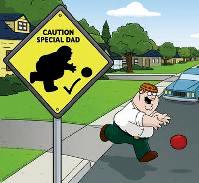He's Just Being Ironic
 Wednesday, October 3, 2007 at 12:46PM
Wednesday, October 3, 2007 at 12:46PM  From Ask Figaro:
From Ask Figaro:
Hey Fig,
What do you make of the fact that the younger generation (college age students) are so steeped in rhetorical messages, from MTV to Myspace, and yet so often fail to advocate for much of anything? Is this a shortcoming on the part of the academy to teach classical rhetoric (public sphere advocacy), or is their rhetoric subtler, more personal, and perhaps the academy needs to adapt (maybe term papers should be “Which is Better: The Simpsons or Family Guy”)?
DB
Dear DB,
The Simpsons.
Oh, wait. That wasn’t your question. Young Americans seem to belong to a particularly ironic generation. As I say in my book, a kid who uses “like” every other word is practicing a form of irony, distancing himself from his own statement. (“Are you, like, freaking or something?”)
Of course, college campuses regularly exceed their quota of idealistic whelps who are perfectly willing to point out the essential evilness of everything you do. But here’s the interesting part: most of what they deem political, previous generations would consider purely personal.
This country has merged the two lives in a way that would have astonished, say, Thomas Jefferson, who earnestly opposed slavery while practicing it. The issue, Jefferson thought, wasn’t Jefferson. It was America. That’s no longer true. A senator who plays footsie in an airport bathroom stall, for example, is no longer qualified to represent the anti-gay movement, even though self-deluded homosexuals often make the very best homophobes.
So what should the academy do about it? For one thing, it should stress the difference between deliberative argument and demonstrative (I call it “tribal”) rhetoric. Deliberative argument deals with choices and speaks to your mutual advantage. Demonstrative rhetoric is all about good and bad, who’s good and who’s bad. When we use tribal rhetoric in politics, the personal becomes political. Americans are skilled at tribal rhetoric, and clueless about deliberative argument. (See chapter 3, “Orphan Annie’s Law,” of Jay’s book.)
As for those term papers on the Simpsons and Family Guy, I’d suggest an oral debate instead. Let a student playing Peter Griffin argue family values with one playing Homer Simpson. The ancient rhetoricians loved this exercise, which they called ETHOPOEIA. May the best cartoon win.
Yrs,
Fig.


Reader Comments (6)
Figaro is saying this only to disguise his lack of erudition.
Fig.
In my observations most people my age group (however on the other side this is limited to my area) that most people's beliefs on ANY issue--war in Iraq, abortion, gun control, gay marriage (or civil union), politics, etc--are all passed down to them from another person in their life and generally are not based on their own conclusions. This means they are unable to justify why they have these beliefs because they are based on (often) faulty second-hand based information. Usually this influence is either the parents or a certain single media figure or source... either way they don't have a balanced source of information.
I have found a few people--who I often become friends with or closer friends with--who are able to carry on deliberative debates without becoming tribal rhetoric.
As for why there is this balance? I can't tell you any significant factors different from others who immediately revert to tribal rhetoric. Then again, I was never a big fan of MTV or MySpace.
The only thing I can say is that my parents never forced any beliefs on me. I wasn't told that I was a Republican or Democrat; I was explained the differences between the two parties.
Hopefully I will also be able to raise my own children someday without influencing their opinions one way or another.
Having raised two kids of my own (now 23 and 19), I've learned that the best way to create a generation of deliberative arguers is to reward argument.
Never mind what opinions you pass along. Challenge them to see the other side, and reward them when they do. Let them win an argument when they make a real effort, even if it doesn't convince you entirely. (It's like when you let them win at Monopoly.)
I can't tell you how much candy they scammed off me that way. but their teeth seem none the worse for it, and their arguments seem all the better.
Fig.
Still, you had me up until MTV being the new opera. It's more like the new Burlesque.
Fig.